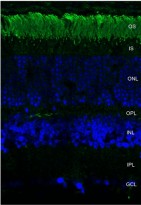ARG22271
anti-Rhodopsin antibody [4D2]
anti-Rhodopsin antibody [4D2] for ELISA,ICC/IF,IHC-Formalin-fixed paraffin-embedded sections,Immunoprecipitation,Western blot and Human,Mouse,Rat,Amphibians,Bird,Fish,Mammal,Shark
Overview
| Product Description | Mouse Monoclonal antibody [4D2] recognizes Rhodopsin |
|---|---|
| Tested Reactivity | Hu, Ms, Rat, Amph, Bird, Fsh, Mamm, Shark |
| Species Does Not React With | Invt |
| Tested Application | ELISA, ICC/IF, IHC-P, IP, WB |
| Specificity | Detects ~40kDa. Binds specifically to the N-terminus of Rhodopsin. Does not detect Rhodopsin in invertebrates. |
| Host | Mouse |
| Clonality | Monoclonal |
| Clone | 4D2 |
| Isotype | IgG1 |
| Target Name | Rhodopsin |
| Antigen Species | Bovine |
| Immunogen | Bovine Rhodopsin |
| Conjugation | Un-conjugated |
| Alternate Names | Rhodopsin; Opsin-2; CSNBAD1; RP4; OPN2 |
Application Instructions
| Application Suggestion |
|
||||||||||||
|---|---|---|---|---|---|---|---|---|---|---|---|---|---|
| Application Note | * The dilutions indicate recommended starting dilutions and the optimal dilutions or concentrations should be determined by the scientist. |
Properties
| Form | Liquid |
|---|---|
| Purification | Purification with Protein G. |
| Buffer | PBS (pH 7.4), 0.09% Sodium azide and 50% Glycerol |
| Preservative | 0.09% Sodium azide |
| Stabilizer | 50% Glycerol |
| Concentration | 1 mg/ml |
| Storage Instruction | For continuous use, store undiluted antibody at 2-8°C for up to a week. For long-term storage, aliquot and store at -20°C. Storage in frost free freezers is not recommended. Avoid repeated freeze/thaw cycles. Suggest spin the vial prior to opening. The antibody solution should be gently mixed before use. |
| Note | For laboratory research only, not for drug, diagnostic or other use. |
Bioinformation
| Database Links | |
|---|---|
| Gene Symbol | RHO |
| Gene Full Name | rhodopsin |
| Background | Retinitis pigmentosa is an inherited progressive disease which is a major cause of blindness in western communities. It can be inherited as an autosomal dominant, autosomal recessive, or X-linked recessive disorder. In the autosomal dominant form,which comprises about 25% of total cases, approximately 30% of families have mutations in the gene encoding the rod photoreceptor-specific protein rhodopsin. This is the transmembrane protein which, when photoexcited, initiates the visual transduction cascade. Defects in this gene are also one of the causes of congenital stationary night blindness. [provided by RefSeq, Jul 2008] |
| Function | Photoreceptor required for image-forming vision at low light intensity. Required for photoreceptor cell viability after birth. Light-induced isomerization of 11-cis to all-trans retinal triggers a conformational change leading to G-protein activation and release of all-trans retinal. [UniProt] |
| Cellular Localization | Membrane |
| Calculated MW | 39 kDa |
| PTM | Phosphorylated on some or all of the serine and threonine residues present in the C-terminal region. Contains one covalently linked retinal chromophore. |
Images (1) Click the Picture to Zoom In
-
ARG22271 anti-Rhodopsin antibody [4D2] IHC image
Immunohistochemistry: Mouse retina stained with ARG22271 anti-Rhodopsin antibody [4D2] at 1:1000 dilution. Other layers of the retina: IS - inner segment; ONL - outer nuclear layer; OPL - outer plexiform layer; INL - inner nuclear layer; IPL - inner plexiform layer; GCL - ganglion cell layer.






